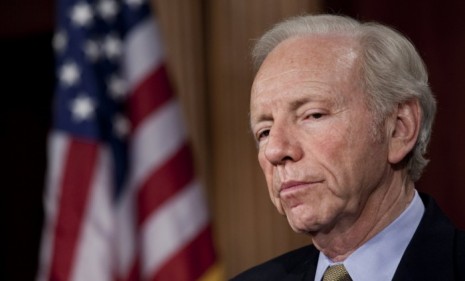The man Democrats love to hate: Joe Lieberman's legacy
The Connecticut senator will retire next year, and liberals aren't sad to see him go. How will we remember him?

A free daily email with the biggest news stories of the day – and the best features from TheWeek.com
You are now subscribed
Your newsletter sign-up was successful
Sen. Joe Lieberman (I-Conn.) said Wednesday he would not seek a fifth term in 2012, signaling an end to a political career that spanned both a Democratic vice-presidential nomination (2000) and an appearance at the Republican National Convention (2008) to drum up support for Sen. John McCain's presidential run. Lieberman became a pariah within the Democratic Party for his enthusiastic support for the invasion of Iraq, and won re-election as an independent candidate in 2006. But, faced with the likelihood of defeat in 2012, Lieberman has now chosen to retire from the Senate. How will Lieberman be remembered by his critics, and supporters? (Watch an AP report about Lieberman's announcement)
For his embrace of neo-conservatism: Lieberman will be remembered for his "post-9/11 rightward lurch on national security," says Michael Crowley in Time, which made him a "bete noire for liberals." Not even championing the end of "Don't ask, don't tell" or advocating for climate-change regulation could redeem him "in the eyes of some of his fiercest liberal critics."
"Joe Lieberman concedes the obvious"
The Week
Escape your echo chamber. Get the facts behind the news, plus analysis from multiple perspectives.

Sign up for The Week's Free Newsletters
From our morning news briefing to a weekly Good News Newsletter, get the best of The Week delivered directly to your inbox.
From our morning news briefing to a weekly Good News Newsletter, get the best of The Week delivered directly to your inbox.
For his willingness to be a turncoat: It wasn't just Lieberman's "unquenchable love for the Iraq war" that made us hate him, says Emily Bazelon in Slate. What about when he "denounced Bill Clinton" over the Lewinsky affair? Or "his romance with John McCain"? Or, just last year, when he held the "health care bill hostage" over Medicare buy-ins? Each "act of grand or petty betrayal" still sticks in Democrats' throats.
"Good riddance, Joe Lieberman"
For his willingness to be principled: Lieberman refused to toe the party line, says Jennifer Rubin in The Washington Post, in favor of "being true to his own deeply held principles." Of course, that means he became a villain to the left. But Lieberman "put country above party, practiced civility, and represented 'no labels'" better than any lawmaker in the U.S. "He'll be missed — by the Senate and the country," if not the still-bitter Democratic party.
A free daily email with the biggest news stories of the day – and the best features from TheWeek.com
-
 Film reviews: ‘Send Help’ and ‘Private Life’
Film reviews: ‘Send Help’ and ‘Private Life’Feature An office doormat is stranded alone with her awful boss and a frazzled therapist turns amateur murder investigator
-
 Movies to watch in February
Movies to watch in Februarythe week recommends Time travelers, multiverse hoppers and an Iraqi parable highlight this month’s offerings during the depths of winter
-
 ICE’s facial scanning is the tip of the surveillance iceberg
ICE’s facial scanning is the tip of the surveillance icebergIN THE SPOTLIGHT Federal troops are increasingly turning to high-tech tracking tools that push the boundaries of personal privacy